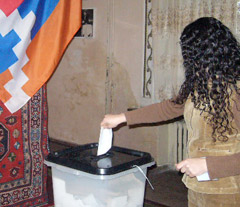On December 10, 2006, fifteen years after the independence referendum, the people of Karabakh voted and got their new Constitution.
Many local and international organizations are still expressing their thoughts and opinions about the referendum. The observers present during the referendum, who claimed that the referendum corresponded to international norms, didn’t make any observations; they even mention that the International Community must accept the referendum results. However the International Community, for example, the heads of European organizations, has announced that it doesn’t recognize the results of Karabakh’s constitutional referendum. This is what general secretary of the European Council Terri Davis said, mentioning that the constitutional referendum which took place in Karabakh is not legal and the International Community is not going to approve the results. According to Davis, the final decision of the status of Karabakh can be elaborated through the means of political negotiations and the intermediary is the OSCE Minsk Group. Davis also said that the future resolution of the Karabakh conflict will be approved based on the respect towards human rights and if a popular referendum is necessary for the confirmation, then the expression of will must be free, fair and suitable for everyone.
Current president of the OSCE and Belgian foreign minister Carl de Gucht also made this kind of announcement. Gucht believes that similar referendums must be evaluated as non-effective steps when it comes time to resolve the existing conflicts.
The people of Karabakh were waiting for this. That’s why President of Nagorno Karabakh Arkadi Ghukasyan told journalists before the end of the referendum that the International Community will be forced to turn the other way being under the pressure of Azerbaijan.
Recently, the Ministry of Foreign Affairs of Nagorno Karabakh expressed doubts about how international organizations treated the Karabakh constitutional referendum. “They’re trying to make everyone doubt the fact that it’s possible for the people of Nagorno Karabakh to have a legal state by making their announcements.” The ministry officials state that the referendum is another step towards instilling democratic principles in the principal law of Karabakh and developing legislation and is aimed towards developing state administration, forming and developing more liberal principles, as well as establishing a civilized society. “With that said, it’s more than strange to hear how the European organizations that adopted democracy and the supremacy of the law try to neglect and deny the democratic and legislative processes taking place in Nagorno Karabakh,” as stated in the message of the foreign ministry, which also states that this is not the first case in the past fifteen years when representatives of private international organizations don’t respond to the processes taking place in Karabakh and Azerbaijan the way they are supposed to.
“Just the fact that the International Community unanimously recognized the results of Azerbaijan’s independence referendum in 1991 but didn’t recognize the same referendum which took place in Nagorno Karabakh before that, encouraged Azerbaijan to go against Nagorno Karabakh, which later became the reason for Azerbaijan’s aggression against Nagorno Karabakh. The ministry of foreign affairs of Nagorno Karabakh hopes that the European organizations will go along with their democratic principles and will review their role on the democratic processes taking place in Nagorno Karabakh.”
Politician from Karabakh David Babayan believes that, judging from the philosophy of values, that kind of response from the organizations is due to the fact that they have mercantile interests which place alternatives-declared values or oil?
“It’s clear that this is not a good selection. After all, if they announce that oil is more important, they will lose the trust of the people who are for democracy. They don’t want to let go of that mission. On the other hand, they need oil a lot. That’s why we get these kinds of contradictions. But it doesn’t end there. It turns out that Davis calls on resolving the conflict with the help of the OSCE Minsk Group, forgetting that Karabakh needs to fully participate in the negotiations in order for that to happen. What’s more, if Mr. Davis and the rest are interested in overcoming the obstacles of the conflict resolution, they have to respond negatively to Azerbaijan’s radical behavior, which was shown by the recent bombing of an auditorium in Moscow where singers from Karabakh were performing. Mr. Davis and others don’t mention that. However, despite all this, the people of Karabakh still stay true to democratic principles,” says D. Babayan.
Some European organizations say that they don’t recognize the results of the constitutional referendum and that the referendum may endanger the Karabakh conflict negotiations process. According to leader of the “Free Homeland” party and Karabakh National Assembly deputy Gagik Petrosyan, “that wouldn’t mean anything to Karabakh if we didn’t have the movement of Armenia and Karabakh towards Europe.” He believes that Armenia and Karabakh are moving towards an “ill” society where there are double standards.
“Europe is not against having Karabakh be a part of Azerbaijan. But doesn’t Europe think that this will require new victims and democratization will stop?” asks the deputy, mentioning that Europe isn’t responding to Azerbaijan’s threats to resolve the conflict through means of war.
“Instead of encouraging the democratic processes in Karabakh and help Azerbaijan become democratic, European organizations are doing the opposite. We can come to the following conclusion: regardless of how Europe treats Karabakh, we, the people of Karabakh, must develop democratization, raise our living standard and strengthen the army. The formula for Karabakh’s success is the correct use of freedom,” says G. Petrosyan.
There were also some positive remarks about the constitutional referendum of Karabakh. U.S. Congressmen Frank Pallone and Joe Nolenberg addressed the President of Nagorno Karabakh Arkadi Ghukasyan with a congratulatory note.
“Let us say that we will continue to help Nagorno Karabakh in the political and democratic development and the approval of the Constitution is a very important step,” as stated in the address.

